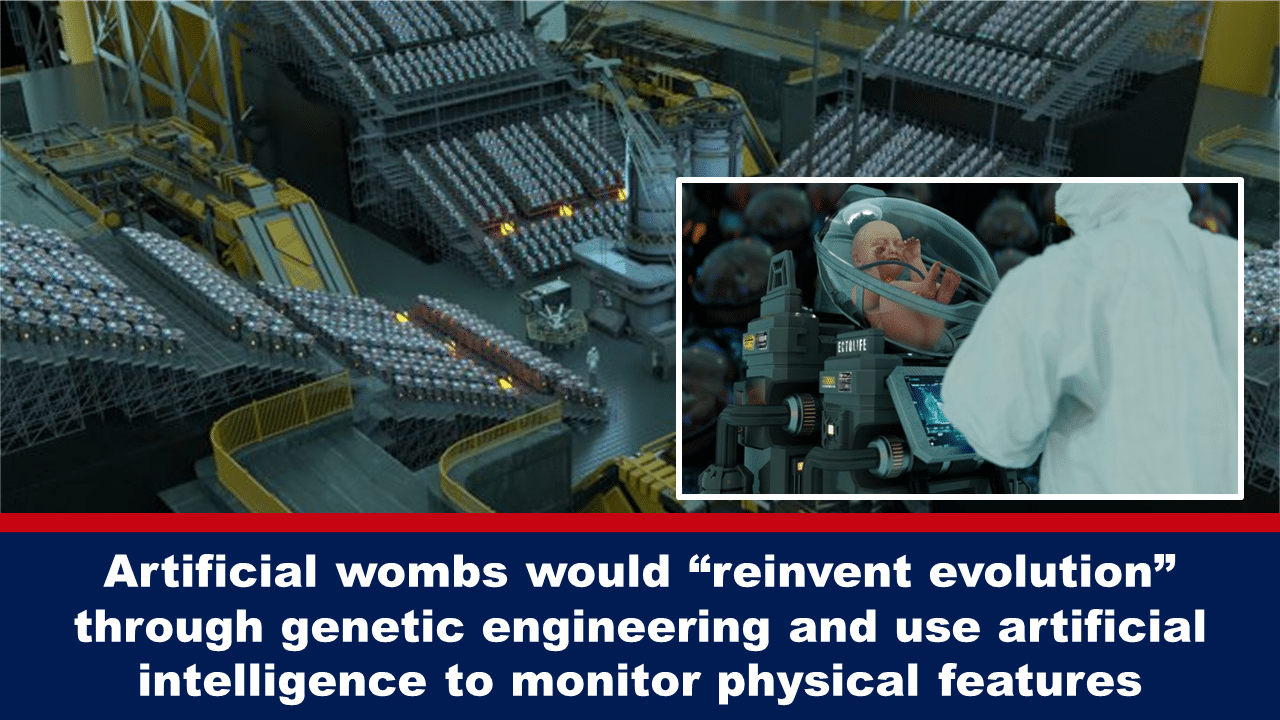Source:
https://expose-news.com/2022/12/12/artificial-wombs-would-reinvent-evolution/
Artificial wombs would “reinvent evolution” through genetic engineering and use artificial intelligence to monitor physical features
Last week we published an article about a dramatic decline in sperm count globally that could threaten mankind’s survival – sperm count has dropped by 62% from 1973 to 2018.
Additionally, we have published numerous articles on the negative effect Covid injections have on both male and female fertility as well as the drop in birth rates, and increase in miscarriages and stillbirths after mass vaccination campaigns began.
After creating the problem, well, voila! There’s a solution looming on the horizon – artificial wombs. So many people simply do not understand how fast humanity is being transformed or what’s coming.
The following are excerpts from ‘EctoLife: Concept Unveiled for the World’s First Artificial Womb Facility’ published by Science and Stuff on 9 December 2022. You can read the full article HERE. We’ve added a few comments as indicated in square brackets.
In 2017, scientists created a “BioBag” that functioned as an artificial womb, and they used it to grow a baby lamb. Now, a new concept has been unveiled showing how the same could be done for humans. In recently released footage, Hashem Al-Ghaili shows what childbirth might look like tomorrow. Specifically, he created an artificial womb facility named EctoLife.
Its purpose? In an exclusive interview with Science and Stuff, Al-Ghaili says he thinks the EctoLife concept could one day supplant traditional birth. In so doing, he said society would finally be able to meet the needs of parents who are “tired of waiting for a response from an adoption agency” and those who are “worried about pregnancy complications.” But most importantly, he says EctoLife could allow us to confront the infertility crisis head-on.
Currently, the World Health Organisation estimates that 15% of reproductive-aged couples worldwide are affected by infertility. Indeed, over the last 70 years, fertility rates worldwide have decreased by a staggering 50%. Reasons for this decline include, among other things, women’s increased education, increases in employment, the high cost of raising children, and a drop in global sperm count. 23 countries are already at risk, with Japan, Spain, Portugal, Thailand, and South Korea at the forefront of the crisis. [There’s no mention of the impact of Covid injections.]
According to Al-Ghaili, the artificial womb concept of EctoLife would be life-changing for many who struggle to conceive. “It’s a perfect solution for women who [have] had their uterus surgically removed due to cancer or other complications. It could also help solve issues that stem from low sperm count,” Al-Ghaili said enthusiastically, adding that the EctoLife concept, or technologies like it, “could ultimately make miscarriage a thing of the past.” [There’s no mention of the impact of Covid injections.]
“It seems probable that we are only several years away from testing [artificial wombs] on human subjects,” Social Ethics and Policy Academic Elizabeth Chloe Romanis wrote in the BMJ’s Journal of Medical Ethics. Meanwhile, Dr. Carlo Bulletti, Associate Professor at Yale University’s Obstetrics, Gynaecology, and Reproductive Science Department, thinks that a fully functioning artificial womb could be realised within the next 10 years.
EctoLife: Reinventing evolution
The EctoLife video shows that the first step prospective parents must take is having their eggs and sperm combined via in vitro fertilization. This would allow them to select only viable and “genetically superior embryos.” Al-Ghaili clarifies that genetically superior embryos are primarily those which are free from genetic issues that would result in miscarriage. However, he notes that the process could also be used to “screen for birth defects,” as is already common practice in most IVF treatments.
But that’s not all.
This would also offer parents the ability to “genetically engineer the[ir] embryo before implanting it into the artificial womb” through the use of the CRISPR-Cas 9 gene editing tool. This would create the opportunity to “fix any inherited genetic diseases that are part of your family history so that your baby and their offspring will live a healthy, comfortable life free of genetic diseases.” This may seem far-fetched; however, Al-Ghaili pointed out that CRISPR has already been used “to correct a genetic mutation in human embryos that is linked to a condition known as hypertrophic cardiomyopathy, which causes the heart muscle to thicken.”
According to Al-Ghaili, the EctoLife facility is also envisioned as making extensive use of artificial intelligence (“AI”), with one of its uses being to provide each baby with “custom nutrients tailored to their needs.” Another use of AI in the EctoLife concept would be to monitor “the physical features of your baby and report any potential abnormalities for deviations from normal gestation.”
Once a baby reaches full maturity? According to the video, the birth process can be “done with just the push of a button,” which will cause the faux amniotic fluid to drain from the growth pod. The impact on humanity could be profound.
[Will they be Homo sapiens? How much will a baby made-to-order cost? Is there a cheaper version if no customisation or modification is requested? Is there a return for faulty goods policy? The answers to these questions don’t bear thinking about. It is one of the most disgusting and dehumanising notions the technocrats have devised so far.]

No comments:
Post a Comment
Note: only a member of this blog may post a comment.